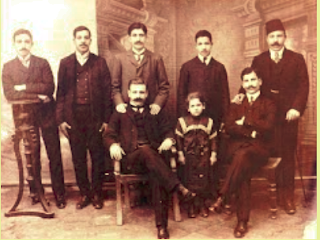
With the demise of the Jewish community of Iraq, you would have thought that their distinctive Judeo-Arabic language will die with them. But a new generation is showing interest in reviving the language of their forefathers. Mardean Isaac, an Assyrian, reports for the Tablet:
Jewish merchants in early 20th century Iraq
Between 1948 and 1951, the vast majority of Iraq’s Jewish population of around 150,000 left the country, interrupting a remarkable literary and linguistic heritage. The Talmud, some of which was composed in Iraq, was written partly in Jewish Babylonian Aramaic, a literary dialect using the Hebrew alphabet. The Jews of northern Iraq spoke particular forms of Aramaic, closely related to the Aramaic spoken by their Assyrian neighbors. Ever-decreasing numbers of Jews in Israel speak those dialects—relics of obscure, mainly rural communities. Other Jewish Aramaic dialects are now only used in academic or religious study.
The predominant Iraqi-Jewish language was a particular form of Judeo-Arabic, a term encompassing forms of Arabic spoken by Jews in Arab countries. Geoffrey Khan, a professor of Hebrew at Cambridge University, has done pioneering work on the spoken Aramaic dialects of the Assyrians and Jews of Iran and northern Iraq. “Jewish Baghdadi is different in all levels of structure, phonology, morphology, syntax, and lexicon, from Muslim and Christian dialects of Iraqi Arabic,” he told me. Regarding the influence of Aramaic in Judeo-Arabic, Khan noted: “There do seem to be some elements that have been influenced by an Aramaic substrate, though it is not always easy to prove it.”
As far as linguistic aspects that exist across Judeo-Arabic dialects, he selected as one case the pronunciation of the /r/ as in an uvular /r/, a feature of Judeo-Arabic both in Iraq and in North Africa. Following the Arab invasions in the 7th century, Arabic supplanted Aramaic as the lingua franca of the region. As the importance of Baghdad rose, Jews established a strong presence there. By the early 20th century, Baghdad was about a third Jewish. Some communities of Jews in northern Iraq—like Assyrians and Mandaeans—continued to speak Aramaic, adopting Arabic or Kurdish only for external use. Baghdadi Jews would imbue their own distinct heritage into the Arabic language. The phenomenon of Iraqi Judeo-Arabic mirrors the status of Jews in relation to Iraq, as a people whose culture and habits were deeply shaped by broader Iraqi society and politics, yet who lived in parallel to it.
In that status, it joins not only other Jewish diaspora dialects, but a legacy of languages in the Middle East that bear the trace of communities who navigated all sorts of political transformations before the homogenizing cultural and demographic forces set in motion by the collapse of the Ottoman Empire and the establishment of often-murderous nation states. The disappearance from Iraq of Assyrians, Jews, and other ancient groups like the Mandaeans, who also have a fascinating religious literature in their own Aramaic dialect, has only laid bare the lack of literature reflecting the linguistic richness and particular experiences of Iraq’s various peoples.
“Like their Muslim and Christian peers, Jewish-Iraqi authors, poets, and journalists looked down on colloquial speech,” the Jewish-Iraqi scholar Eli Timan told me. “Their definition of ‘eloquence’ was confined entirely to Fus’ha [classical Arabic]. In my opinion, this was a tragedy for our community and explains the dearth of Jewish-Iraqi documents in the field of literature.”
It is eloquent of its ghostly status that some of the best fiction written in Iraqi Judeo-Arabic will likely prove to be the last. Samir Naqqash, an Iraqi-born Israeli novelist, wrote exclusively in Arabic. He refused to accept that he had lost Iraq and become Israeli, and refused to adopt Hebrew despite the decision ruining his career prospects. Naqqash instead wrote novels that conjured a vanished past of Iraq’s dialectal and ethno-communal richness using the Judeo-Arabic (and other Baghdadi dialects) of his childhood that served as the keyhole to that past, and its only portable element. Since his death in 2004, no new literature featuring Iraqi Judeo-Arabic has been published.

Leave a Reply